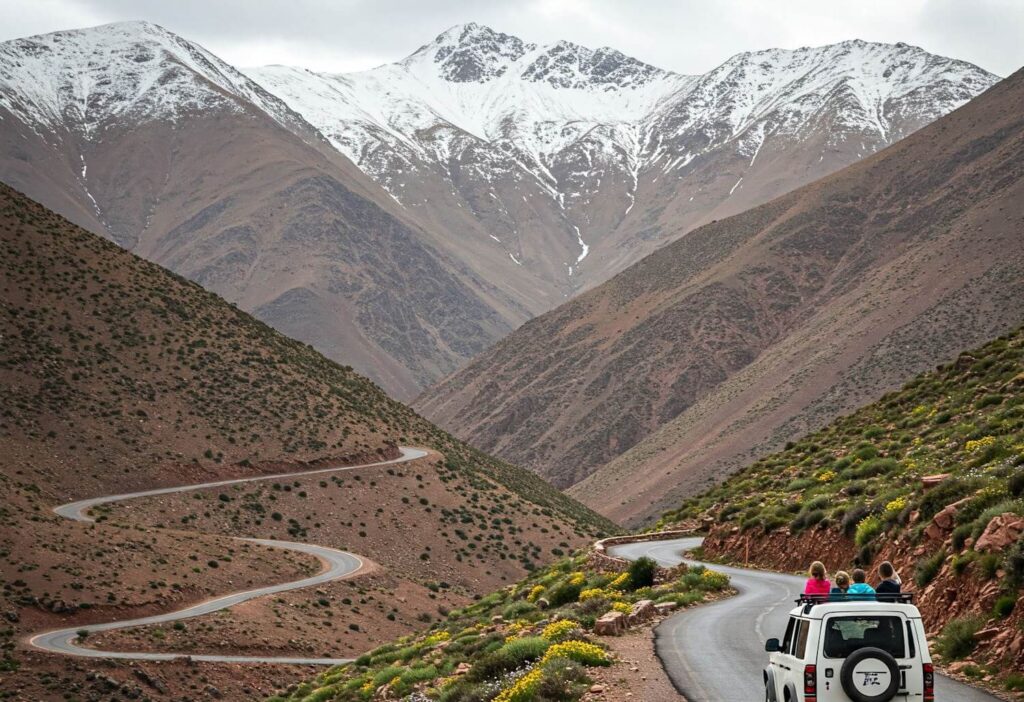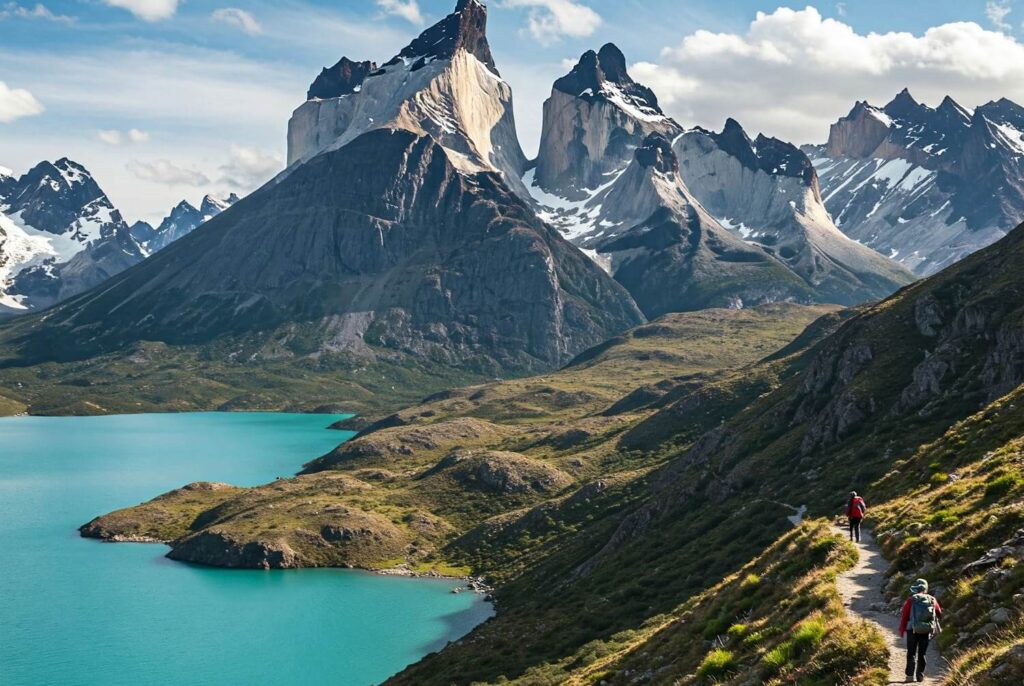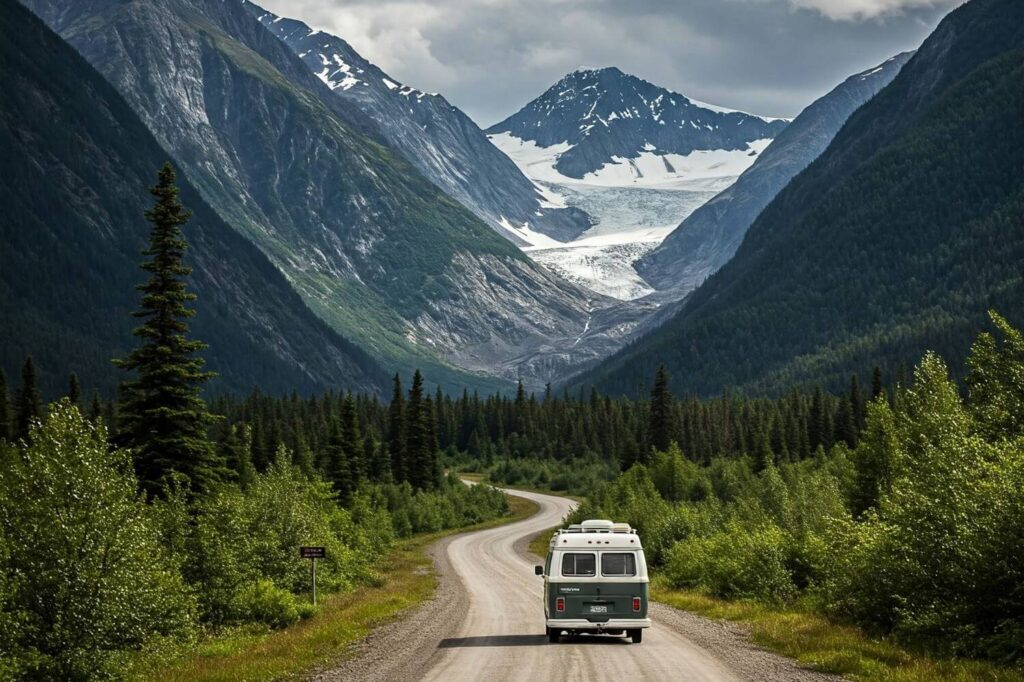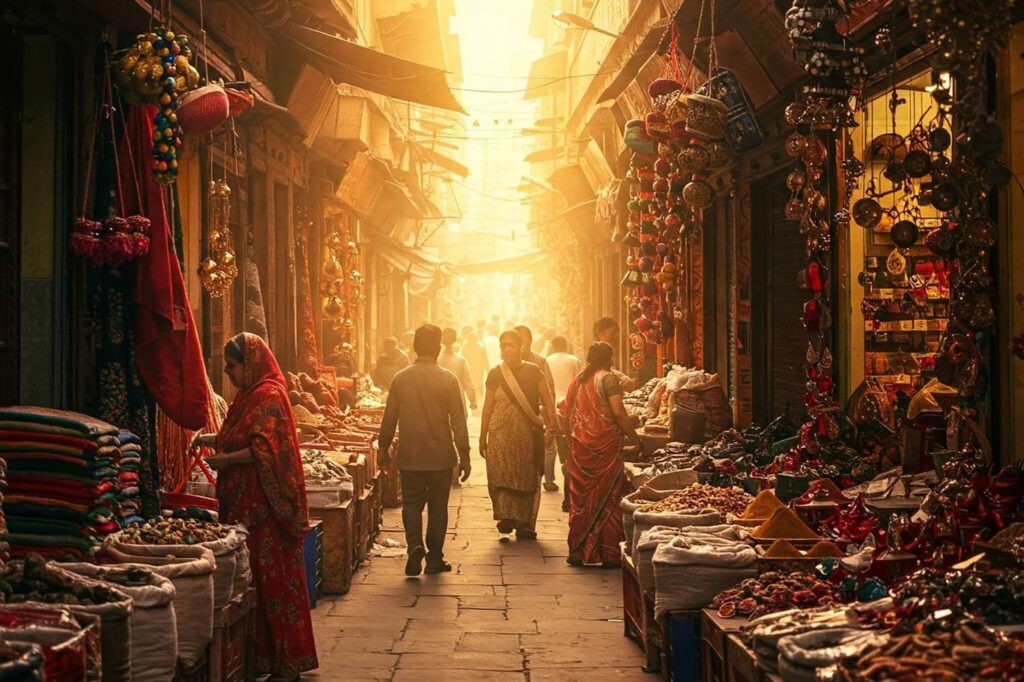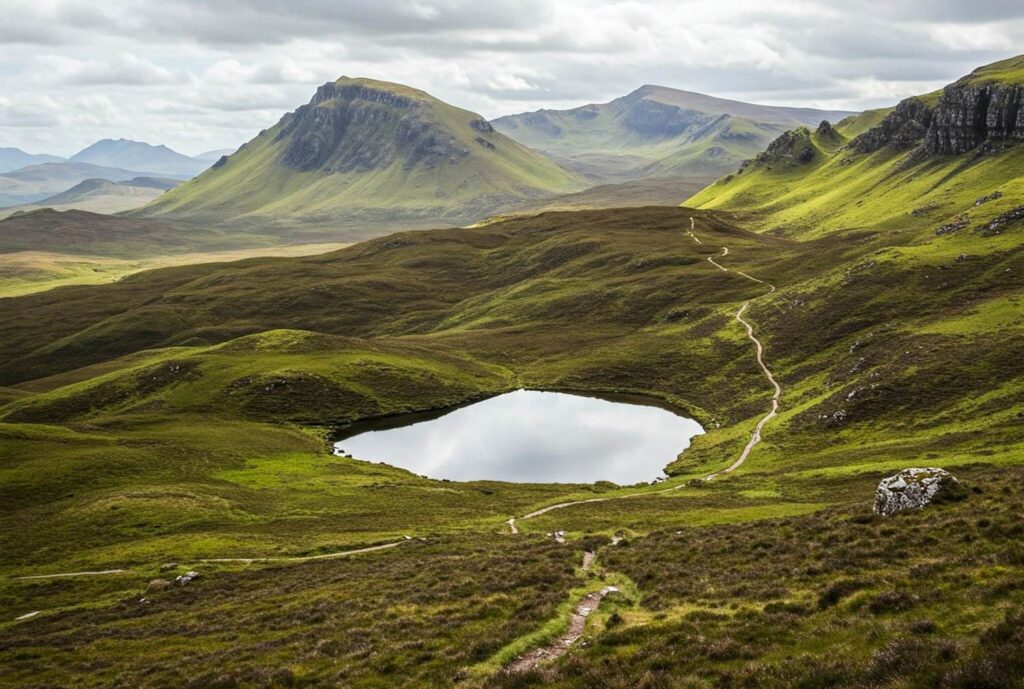Introduction to the Atlas Mountains
The Atlas Mountains are a remarkable range located in central Morocco, extending over 2,500 kilometers across the country and significantly influencing its geography. This majestic mountain range acts as a natural barrier between the Atlantic Ocean and the Sahara Desert, showcasing a diverse array of landscapes, from high peaks and valleys to expansive plateaus and gorges. The geographical significance of the Atlas Mountains cannot be understated, as they represent not just a visual marvel but also an ecological hotspot that hosts a wealth of biodiversity.
The terrain is characterized by rugged peaks, the highest of which is Toubkal, rising to 4,167 meters above sea level. This spectacular elevation offers breathtaking views of the surrounding landscapes, making it a popular destination for trekkers and adventure enthusiasts. In addition to its striking scenery, the Atlas Mountains are home to an extensive variety of flora and fauna, including endemic species that thrive in this unique environment. These attributes collectively make the region an appealing destination for nature lovers and those seeking outdoor experiences.
Culturally, the Atlas Mountains hold significant importance for various indigenous Berber communities that have inhabited these rugged terrains for centuries. Their rich traditions and unique ways of life contribute to the cultural tapestry of the region, offering visitors an authentic glimpse into local customs, cuisines, and crafts. Exploring the Atlas Mountains during a road trip allows travelers to immerse themselves in the vibrant culture of the Berbers while discovering picturesque villages nestled within the mountains.
A road trip through this enchanting mountain range promises a multitude of unforgettable experiences, from scenic vistas and diverse wildlife to cultural exchanges with the local communities. As adventurers traverse winding roads and ascend soaring peaks, they will undoubtedly find themselves captivated by the charm and grandeur of the Atlas Mountains, making this journey an essential part of any Moroccan travel itinerary.
Planning Your Road Trip
Embarking on a road trip through Morocco’s Atlas Mountains is an adventure that requires careful planning to ensure a safe and enjoyable experience. One of the first considerations is the timing of your journey. The ideal months to visit are typically from April to June and September to October, when the weather is mild and road conditions are more favorable. During the summer months, particularly July and August, temperatures can soar, and winter months may bring snow, impacting accessibility in higher altitudes.
Choosing the right route is another critical aspect of your planning process. The main roads connecting key cities like Marrakech, Ouarzazate, and Agadir offer stunning views and are well-maintained. For those looking for an adventurous twist, consider taking lesser-known paths that lead you through remote Berber villages, tiqiin climbs, and breathtaking valleys. Researching various itineraries can help identify the most picturesque routes while allowing you to explore hidden gems along the way.
Vehicle selection is paramount for traversing the diverse terrain of the Atlas Mountains. A 4×4 vehicle is highly recommended due to the rugged roads that may be encountered, especially if you plan to explore the more remote areas. Ensure that your vehicle is well-maintained and suitable for long drives, and consider equipping it with essential camping gear and navigation tools. Additionally, it is wise to carry a spare tire, extra fuel, and emergency supplies to prepare for unforeseen circumstances.
Lastly, familiarizing yourself with the local culture and customs can greatly enhance your road trip experience. Interact with the locals, respect their traditions, and be conscious of environmental preservation. Proper planning will undoubtedly contribute to a rewarding adventure through Morocco’s stunning Atlas Mountains.
Must-See Destinations in the Atlas Mountains
The Atlas Mountains are a breathtaking tapestry of natural beauty, rich culture, and historical significance. Among the many stunning locations, Imlil stands out as a charming village that serves as the gateway to Mount Toubkal, the highest peak in North Africa. A visit to Imlil is essential for adventure enthusiasts, as it offers various trekking opportunities that cater to different skill levels. The village itself is adorned with picturesque adobe houses and offers a chance to interact with the local Berber community, known for their warm hospitality.
Further along your journey, Ait Benhaddou captures the essence of Morocco’s historical architecture. This UNESCO World Heritage site is famous for its well-preserved mud-brick structures that once served as a stop for traders on their way to the Sahara. Exploring the narrow alleys and climbing to the top of the hill provides not only a glimpse into the past but also offers stunning panoramic views of the surrounding region. Ait Benhaddou has also served as a backdrop for several blockbuster films, making it a captivating destination for movie buffs.
Ouarzazate, often referred to as the “Gateway to the Sahara,” is another key destination that travelers should consider. Renowned for its studios and film industry, Ouarzazate is home to famous sites like the Atlas Film Studios and the Taourirt Kasbah. Visitors can delve into the art of filmmaking and explore the history of this vibrant town. Furthermore, Ouarzazate provides access to the breathtaking landscapes of the Draa Valley and the stunning Oasis of Skoura, making it an ideal base for further exploration. Each of these destinations within the Atlas Mountains offers unique experiences that can enrich your journey, showcasing the diverse attractions that await visitors.
Cultural Encounters and Local Communities
The Atlas Mountains are not only a stunning geographical marvel but also home to dynamic cultural diversity, primarily represented by the Berber communities. These indigenous people have a rich history that is evident in their unique traditions, languages, and lifestyles. Engaging with local communities provides travelers an opportunity to immerse themselves in this cultural tapestry, enhancing their overall adventure in Morocco.
The Berbers, known as Amazigh, have preserved their customs for centuries, and their culture remains largely intact amidst modern influences. Visitors to the region will find that Berber hospitality is a fundamental aspect of their society. A simple greeting or a shared meal can lead to meaningful interactions that offer insights into their daily lives and age-old practices. Travelers are encouraged to participate in local festivals, often marked by music, dance, and traditional attire. Such events not only serve as a reflection of the local heritage but also foster deeper connections with the community.
Language plays a significant role in these cultural exchanges. While Arabic is widely spoken, many Berbers communicate in Tamazight or Tachelhit, dialects that are integral to their identity. Learning a few key phrases can significantly enhance the travel experience, showcasing respect for their culture and facilitating communication. It encourages spontaneous conversations, paving the way for authentic storytelling and shared experiences.
To truly appreciate the essence of the Atlas Mountains, engaging with the local communities should be a focal point of one’s journey. By respecting their customs and actively participating in cultural activities, travelers not only enrich their own experiences but also contribute to the preservation of Berber traditions. This mutual respect forms a bridge between the traveler and the local communities, fostering understanding and appreciation of the rich heritage that defines this breathtaking region of Morocco.
Outdoor Activities and Adventures
The Atlas Mountains in Morocco offer a diverse array of outdoor activities that cater to adventure seekers of all levels. Whether you are a seasoned explorer or a casual hiker, the majestic landscapes provide ample opportunities to engage with nature. One of the most popular activities is hiking. The mountains boast several trekking routes, including the well-known Toubkal National Park. This park features trails suitable for both beginners, such as the route to the Imlil Valley, and seasoned trekkers, who might consider summiting Mount Toubkal, the highest peak in North Africa. Guided tours are available, which can enhance your experience by providing insights into the local culture and geography.
For those looking for more adrenaline-pumping experiences, the Atlas Mountains are ideal for rock climbing. Various climbing routes exist, catering to different skill levels, with Todra Gorge being a notable destination. Here, climbers can challenge themselves on vertical limestone cliffs while surrounded by breathtaking views. If mountain biking piques your interest, certain trails throughout the region provide fantastic routes that traverse picturesque scenery. Mountain biking companies offer rentals and guided adventure tours that ensure safety while exploring off-the-beaten-path trails.
When planning your outdoor activities, it is advisable to consider the best time of year for your chosen adventure. Spring and autumn tend to present the most favorable weather conditions. Additionally, ensure you are adequately prepared with appropriate gear, hydration, and food supplies. Local guides can offer valuable insights on trail conditions and safety tips, making them a essential resource for navigating the undulating terrain. Embarking on an outdoor adventure in the Atlas Mountains not only provides physical challenges but also a deep appreciation for Morocco’s stunning natural beauty.
Traveling Responsibly in the Atlas Mountains
Traveling through the majestic Atlas Mountains offers not only breathtaking views but also a unique opportunity to engage in responsible tourism. As travelers, it is imperative to recognize the significance of minimizing our environmental impact and supporting local economies during our adventures. By adopting responsible travel practices, we can ensure the preservation of this stunning region for future generations.
One way to travel responsibly is by choosing eco-friendly accommodations and transport options. Look for lodgings that promote sustainable practices, such as those utilizing renewable energy sources or providing locally sourced meals. When possible, opt for public transport or shared rides to reduce your carbon footprint. These choices not only benefit the environment but also often lead to deeper interactions with the local culture.
Effective waste management is another crucial aspect of responsible travel in the Atlas Mountains. Travelers should minimize waste by using reusable products such as water bottles, shopping bags, and utensils. It is essential to dispose of waste properly, particularly in remote areas where waste management systems may not be in place. Visitors should always carry their trash out and leave no trace in nature, preserving the pristine environment for others to enjoy.
Moreover, supporting small-scale tourism is vital to benefiting local communities. Engage with local artisans, guides, and businesses rather than multinational corporations. This not only provides a more authentic experience but also ensures that your financial contributions directly support the people who inhabit the region. Consider participating in cultural tours or workshops that empower local providers, fostering a greater understanding of their traditions and helping to sustain their livelihoods.
By embracing these responsible travel practices, visitors to the Atlas Mountains can contribute positively to the environment and support the local economy, creating a more sustainable and enriching travel experience.
Accommodations in the Atlas Mountains
When planning a road trip through the enchanting Atlas Mountains of Morocco, finding the right accommodations is essential to enhance your adventure. The region offers a diverse range of lodging options, catering to different preferences and budgets. From luxurious hotels to charming guesthouses and unique camping experiences, the Atlas Mountains have something to suit all travelers.
For those seeking a lavish stay, several upscale hotels provide stunning views and exquisite amenities. Properties like the Kasbah Du Toubkal, located near Imlil, offer opulent rooms adorned with traditional Moroccan decor, allowing guests to immerse themselves in the local culture. The hotel’s restaurant serves authentic Moroccan cuisine and reflects the vibrant culinary traditions of the region. Additionally, many luxury hotels offer guided excursions and wellness retreats that enable visitors to explore the breathtaking landscapes while enjoying top-notch services.
Alternatively, travelers who prefer a more authentic experience can opt for traditional guesthouses or “gîtes.” Places like the Berber Lodge in the Toubkal National Park provide a warm, homely atmosphere where guests can interact with local families. These accommodations often feature rustic decor and home-cooked meals, giving visitors a real taste of Moroccan hospitality. The sense of community in such settings allows for deeper connections with the local culture.
For the more adventurous, camping is an excellent way to experience the majestic landscapes of the Atlas Mountains. Several campsites are strategically located, allowing travelers to enjoy stunning vistas under starry skies. Glamping options are also available, providing comfortable tents equipped with necessary amenities, ensuring a balance between adventure and comfort. Camping in the Atlas Mountains enables travelers to truly connect with nature, making it a memorable aspect of their journey.
Culinary Delights Along the Journey
Traveling through the Atlas Mountains in Morocco offers not only breathtaking landscapes but also an opportunity to indulge in the rich tapestry of Moroccan cuisine. Renowned for its vibrant flavors and use of fresh, local ingredients, the culinary experiences available along the route can enhance any road trip adventure. The journey presents a unique opportunity to savor traditional dishes such as tagine, couscous, and pastilla.
Tagine is a quintessential Moroccan dish, typically slow-cooked in a traditional earthenware pot. Travelers can expect to find variations that showcase local meats, seafood, or a medley of vegetables, often accompanied by an assortment of spices like saffron, cumin, and coriander. Many roadside eateries and larger restaurants in cities such as Marrakech, Ouarzazate, and Imlil serve excellent tagine, offering a taste of the authentic culinary culture. For those keen on street food, do not miss the chance to try kebabs or harira, a nourishing soup enjoyed especially during Ramadan.
In addition to local restaurants, culinary tours provide an immersive experience into Morocco’s gastronomic richness. Many tour operators offer cooking classes where visitors can learn to prepare traditional dishes, providing an engaging way to understand the significance of each ingredient. Such classes often involve visits to local markets, where participants can choose fresh produce and spices, fostering a deeper appreciation for Moroccan culinary practices.
As you wander through charming villages and bustling markets in the Atlas Mountains, the array of flavors and aromas will invite you to explore further. Whether indulging in a meal at a family-run restaurant or taking part in a cooking class, these culinary delights undoubtedly shape the adventure, creating lasting memories that enhance the overall experience of the journey through Morocco.
Conclusion: Embracing the Adventure
As we reflect on the exhilarating journey through Morocco’s Atlas Mountains, it becomes clear how this region captures the essence of adventure and exploration. The winding roads that carve through majestic peaks offer not only stunning vistas but also an invitation to connect with nature and culture in profound ways. Each bend in the road reveals a new landscape, from rugged mountain trails to serene valleys dotted with traditional Berber villages. This captivating terrain beckons travelers seeking both tranquility and thrill.
Engaging with the diverse communities along the way enriches the experience, as local customs and traditions unfold like the landscape itself. Visitors have the remarkable opportunity to taste authentic Moroccan cuisine, witness age-old crafts, and partake in folk stories that echo through generations. Every encounter adds a unique layer to the journey, making it highly memorable. The Atlas Mountains’ charm lies not just in its beauty but also in the warmth of its people, allowing for a deeper appreciation of Moroccan culture.
However, embarking on this adventure is not without its challenges. The terrain can be rugged, and unexpected weather conditions may arise, testing one’s resolve. Yet, it is precisely these hurdles that contribute to the adventure and ultimately lead to personal growth. The exhilarating sense of accomplishment upon reaching a mountain summit or discovering a hidden oasis serves as a rewarding reminder that the greatest journeys are often filled with both trials and triumphs.
In summary, a road trip through the Atlas Mountains is an invitation to embrace both the challenges and rewards that come with exploration. The breathtaking scenery, rich culture, and the experiences shared with fellow travelers create lasting memories that resonate long after the journey ends. As you consider your next adventure, let the allure of the Atlas Mountains draw you into this captivating world waiting to be discovered.

